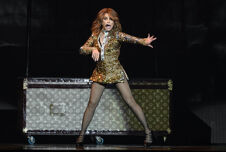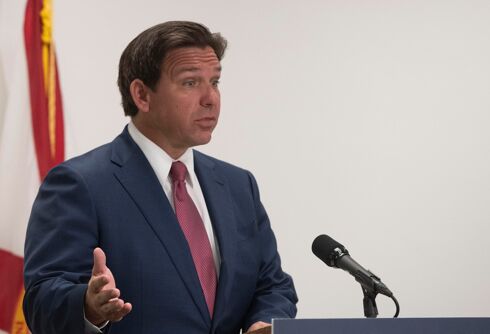35-year-old Cipriani is blind, though that wasn’t always the case. Nine years ago, he was beaten in San Francisco’s Castro District. The attack resulted in him losing his sight. But he hasn’t let that stop him from living a meaningful life or making a lasting impact in the world.
Last year, Cipriani was named “Best Disability Advocate” in the San Francisco Bay Area by SF Weekly, and had the honor of being selected as a Community Grand Marshal for the 2015 SF Pride Parade–the first blind Grand Marshal in the parade’s nearly 50-year history. Today, he is the author of the acclaimed memoir Blind and the book Midday Dreams, as well as the national spokesman for 100 Percent Wine.
Queerty: For people who aren’t familiar with your story, you weren’t always blind. Can you briefly explain what happened?
Cipriani: Back in 2007, I was at the height of my career. I was working in Silicon Valley. I had just bought my first place in San Francisco. Life was good. I was in my 20s, I was young, I was fit. One day, I came across this group of friends from my childhood. These were other gay men. I was happy to see them. They weren’t happy to see me. They immediately started verbally attacking me and then it turned into an assault. I got kicked a few times in the head, and that lead to retinal damage, and that led to blindness.
And because it’s retinal damage, there’s no way to undo it, right?
Correct. It’s permanent. I did have some surgeries in the beginning. Each time I would get some vision back, but then it would go away again. The doctor explained that it was because of the scar tissue. The last time I had surgery I woke up and everything was pitch black. I never got anything back. Most blind people have some level of vision, whether it’s shadows or light perception. Only about seven percent of people are completely blind, which means they see pitch darkness, and I’m among that seven percent. So often when I hang out with other blind folks, I am the most blind in the bunch.
Definitely. Sometimes people can’t tell that I’m blind. In a dark club, under flashing lights, in dim rooms, I’m just someone else dancing. People often grab me and I ask them who they are and they get defensive like, “Who the hell are you? You’re not all that anyway!” (Laughs.) I have to explain to them that I’m blind, and then they apologize for my blindness, which is how people often react to a disability.
By apologizing for it?
Exactly. Especially in gay clubs. I’ll be walking with my white cane and I’ll have men come up to me and say “Oh, you poor thing. I’m so sorry you’re blind.”
 What do you say in response?
What do you say in response?
You know, it all depends on my mood. Initially, going from someone who was a businessman who was well-respected and well-connected in the Bay Area, to someone who the general public doesn’t know how to interact with would make me angry. Sometimes I’d get snappy with people. Now I usually just say, “Hey, it’s not necessary, I’m fine,” or I’ll just smile. I’ve come to terms with he fact that sometimes when people say things it comes from a lack of experience or exposure. As a society we’re not trained how to interact with people with disabilities.
What other challenges have you run into?
I’ve had people romanticize my disability. They turn it into a fetish. I’ve had guys at bars say, “I’ve always wanted to fuck a blind guy. Let’s go back to my place.” My blindness is a part of me, but it’s not my whole identity.
Does it make you angry when people say things like this?
It used to. And then I realized that it was not being fruitful. I feel that within the gay community, at large, there’s this consensus that if you can’t sleep with somebody they’re not useful to you. They can’t be your friend. They can’t be your acquaintance. But I don’t believe in that. I believe that if a guy is talking to me, I’ll treat him with respect, and if I can get a friendship out of that, that’s wonderful.
What is dating like for you?
Dating is a lot about putting yourself out there, and letting people know what your weaknesses are and what your strengths are. A lot of people, when they see my blindness, they think it’s my whole identity and I have to tell them no, I live alone, I’m a homeowner, I don’t need someone to take care of me. And I think that’s the biggest misconception people have about dating people with a disability, that we need a caretaker.
Are you in a relationship now?
I am, actually. I have a boyfriend. He’s also blind. We hang out in the Castro in San Francisco a lot. We met through a friend at a party. We’ve been dating for seven months now and things are good. When you’re going out with somebody who’s not disabled, you have to teach them how to be with you, and that takes time. This is the first time where he knows everything — he knows the etiquette, we both read Braille, we use the same adaptive technology — and it’s so nice to not have that period of teaching somebody. We can just move into the romance.
 How has sex changed for you?
How has sex changed for you?
I had to do a rewiring. What my doctor told me is that the way the brain takes in information is 80 percent through vision and the remaining 20 percent is distributed through other senses. When the vision gets taken away, you go through a process where the other senses fight to take over. What really changed is my sense of smell and my sense of touch. I could feel things very well. So sex became more sensual.
When I was sighted, sometimes I’d look at people and be so focused on the visual aspect. I liked brunettes. Black, Asian, Latino. I thought they were all amazing. When I became blind, that wasn’t the big thing anymore. I became attracted to big hands and square jawlines. How I evaluate attractiveness has become more tactile.
What about one night stands?
For me, when I’m sleeping with somebody, I need to connect. There’s no more of that bam-wham-thank-you-ma’am, you know? I have to take my time and really savor every minute of it. As a person with a disability, vision loss especially, you have to sometimes take your time with things. And I think that was one of the biggest lessons for me. I had to learn to slow down. With men specifically. It was really tough to just jump into bed with someone without getting to know them a little bit.
Is there anything you miss being able to see?
There was a time when I mourned my vision loss. The first two or three years of blindness were very tough, and I did suffer from depression. But as I learned to connect with the world in a different way, I realized that I’m not missing out on anything. Right now I can smell the rain before it falls. I can’t see the water drip, but I can hear it. I’ve found a different way to connect with the world, and it makes me happy. I’m content.
If you could go back ten years and tell your 26-year-old self who was still sighted one thing, one piece of advice, what would it be?
If I could talk to that person who I was before, I would just tell him that there’s always something after the nothing. That’s something that has really helped me in dealing with my disability. Gay men, in general, we have a lot of fears. We have fears of gaining weight. We have fears of getting old. We have fears of not being able to do certain things. All these fears, what they do, is block things out. We’re unable to see beyond them. But there really is something after the nothing. And so that’s what I would tell the 26 year old.
It doesn’t end here.
Exactly.
h/t: Queerty














